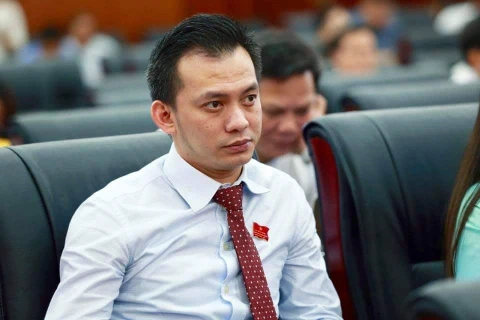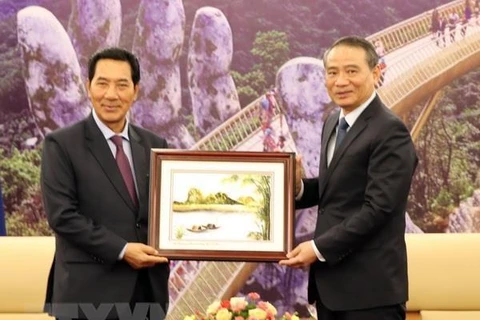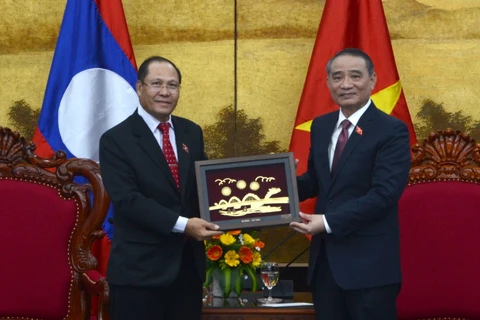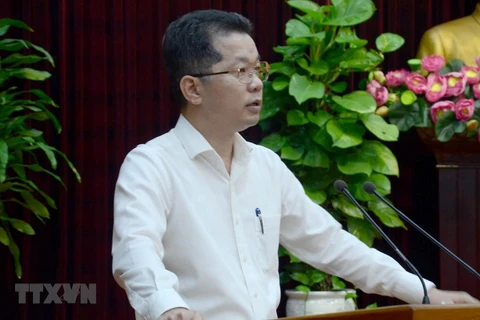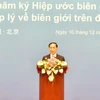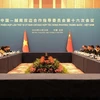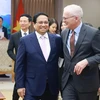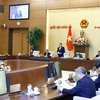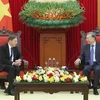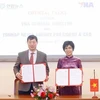Da Nang (VNA) - Permanent Deputy Prime Minister Truong Hoa Binh, who is also a Politburo member, attended the opening of the 22nd Congress of the Da Nang municipal Party Organisation for the 2020-2025 tenure on October 21, with 349 delegates taking part.
Addressing the ceremony, the official asked Da Nang to be more drastic in its Party building efforts during the next tenure, considering this a crucial issue during the development process.
The city is required to streamline personnel work, step up administrative reform, perfect the smart city and digital administration models, and strengthen the close bonds between the Party and the people.
It was also assigned to improve personnel quality, take concerted measures to overcome the COVID-19 impact, and step up investment, especially in strategic and high-tech areas, towards building a city worth living in that will serve as a nucleus for the development of the central region.
He added that the Congress must elect moral and talented officials to the municipal Party Committee, contributing to fulfilling the Resolution adopted at the Congress.
During the 2015-2020 tenure, the city focused on three socio-economic strategic breakthroughs and took drastic actions to protect the environment, respond to climate change, and prevent natural disasters.
It remained among the five leading localities in the provincial competitiveness index, topped the country in the information and communications technology (ICT) index for 11 consecutive years, and is one of the best-performing localities in terms of administrative reform.
This year, the city fulfilled the twin goals of fighting the pandemic and restoring socio-economic development.
Its gross regional domestic product (GRDP) grew by around 7.5 percent annually during the 2016-2019 period, or a 1.5-fold increase against 2015.
A number of international-scale events were held in the city, most notably the 2017 APEC Economic Leaders’ Week, the International Fireworks Festival, and the Smart City Summit, among others.
The rate of local poor households is expected to fall to 2.04 percent later this year and has declined 1.13 percent each year on average.
During the 2020-2025 tenure, the city will continue with building a strong and transparent Party, improving the leadership of the Party Organisation, building a transparent and service-oriented administration, and upholding democracy and the role of the provincial Fatherland Front chapter and socio-political organisations.
It will also effectively conduct economic restructuring and renew the growth model, enhance growth quality and economic competitiveness on the back of science and technology as well as innovation amid Industry 4.0, and build harmonious infrastructure in line with the city’s master plan to 2030 and vision to 2045.
The Congress is scheduled to last until October 22, with the election of officials to the municipal Party Committee, its Secretary and Vice Secretary, and the Inspection Commission and its head.
Da Nang, one of the major socio-economic hubs of the country, has seen booming development in the recent years.
Before 1997, Da Nang was a small city with mainly temporary houses.
The Politburo on October 16, 2003 issued Resolution 33 to develop the city during the nation’s industrialisation and modernisation process, and since then the city has issued breakthrough policies for infrastructure and socio-economic development.
From just 100 streets, the city now has nearly 2,500 streets and new bridges. The city has successfully connected the two sides of the Han River, and connected the city’s centre with other areas and neighbouring provinces and cities. The urban area has quadrupled since 2003.
Urban construction, natural resources and environmental management has been focused on.
The city confirmed its position as a socio-economic centre for the central region with economic growth of 10 per cent per year from 2003-18.
Thanks to flexible and effective policies, the city has attracted human resources, and high quality services such as transport, logistics, finance and banking had advanced and gradually confirmed their important role in the city and the nation.
Da Nang continues to lead the country in terms of Gross Regional Domestic Product (GRDP), Provincial Competitiveness Index (PCI) and the Information and Communications Technology Index (ICT Index).
The average income per person has reached 4,300 USD, a massive increase compared with 1997./.

